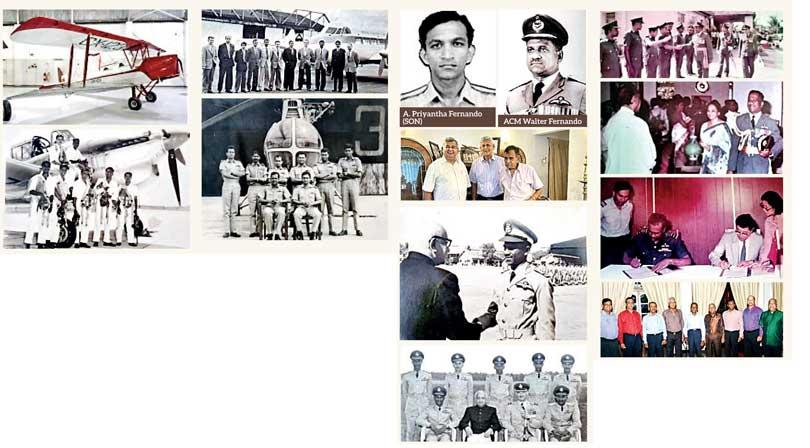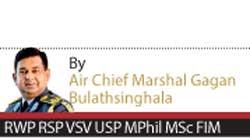Reply To:
Name - Reply Comment

 In the dominion of documenting the remarkable lives and contributions of individuals, timing often plays a pivotal role. Today, we stand at a unique juncture, a moment when Air Chief Marshal (ACM) Walter Fernando is not only with us, but continues to inspire, influence, and shape the younger generations. This is my endavour in publishing this article. First and foremost, ACM Fernando’s lifetime affords us the invaluable opportunity to celebrate his achievements, share his wisdom, and pay tribute to his enduring impact directly on the SLAF.
In the dominion of documenting the remarkable lives and contributions of individuals, timing often plays a pivotal role. Today, we stand at a unique juncture, a moment when Air Chief Marshal (ACM) Walter Fernando is not only with us, but continues to inspire, influence, and shape the younger generations. This is my endavour in publishing this article. First and foremost, ACM Fernando’s lifetime affords us the invaluable opportunity to celebrate his achievements, share his wisdom, and pay tribute to his enduring impact directly on the SLAF.
Furthermore, we honour the principle of recognition and appreciation, a fundamental aspect of human connection. This article is not merely to recount ACM Fernando’s accomplishments, but to allow them to be part of the conversation, to witness the reverberation of his life’s work and influence on others. It is an act of respect and admiration for ACM Fernando’s legacy that this writer unfolds his story.
I embark on this discourse with the utmost respect, gratitude, and a commitment in honouring ACM Walter Fernando’s contributions as they are recorded and will remain in our annals.
Early days
Andibuduge Walter (A.W) Fernando was born on December 12, 1932 and was educated at Maris Stella College, Negombo. He joined the Royal Ceylon Air Force as an Officer Cadet in the second batch of pilots in January 1953. From a young age ACM Fernando was captivated by the allure of flying. Born amidst a backdrop of ancestral stories and traditions, he drew inspiration from the wisdom of his community and the teachings of the elders. With a profound understanding of the interconnectedness of the past and the future, Fernando embarked on a journey that would rewrite the script of what it means to be an aviator.
Breaking through societal barriers and dispelling stereotypes, ACM Fernando carved a path that resonated with their aspirations and those of their community. Amidst the challenges of pursuing an aviation career, his unwavering determination led him to the cockpit, where he honed his skills and distinguished himself to excellence.
Receiving wings
After receiving flying training in Ceylon, he was commissioned as a pilot officer. Soon after the commissioning he took a course on navigation and ground instruction with the RAF. On his return to Ceylon, he became one of the first helicopter pilots in the RCyAF and in 1958 became the Navigation Officer, RCyAF Katunayake.
The same year, ACM Fernando accompanied several other pilots to the UK to ferry two de Havilland Herons to Ceylon acquired for the RCyAF. In 1959, he was appointed Chief Ground Instructor, Flying Wing at RCyAF.
Career Path
In 1970 Squadron Leader A.W. Fernando took command of the No 4 Helicopter Flight with three Bell Jet Ranger 206s. On January 15, 1971, a significant transformation took place when the No 4
Helicopter Flight was graduated and re-designated as No. 4 Helicopter Squadron and continued to remain under the command of Squadron Leader A.W. Fernando with Bell 206 Jet Ranger helicopters. The role of this squadron was mainly VIP transport, reconnaissance, cargo transport, air/sea, and jungle rescue.
ACM Fernando attended and graduated from the RAF Staff College, Bracknell, and the National Defence College (21st Course), New Delhi, India.
He served as Commandant Air Force Academy and Base Commander at SLAF China Bay, and Director of Flying Operations. ACM Fernando was appointed as Chief of Staff of the Air Force in 1981, serving until April 1985.
Assuming Command
On May 1, 1985, he was appointed 7th Commander of the Sri Lanka Air Force in the rank of Air Marshal, the first Air Force officer to be promoted to that rank on appointment as Commander of the Air Force.
His tenure saw the expansion of the Air Force with the onset of the Sri Lankan internal conflict. In 1983, he was awarded the Vishista Seva Vibhushanaya. He retired from the Air Force on July 31, 1990 having been promoted to the rank of Air Chief Marshal, the first Air Force officer to be promoted to that rank.
Sri Lanka Air Force has been engaged in operations almost continuously since the early 1980s and there is much that we have learned in this period regarding generating, employing and sustaining air power. So, we have seen the emergence of critical new capabilities and technologies that fundamentally shape the way we do business.
Ascending to the role of Air Force commander, ACM Fernando became a beacon of leadership, inspiring a new generation of aviators. His journey is a vivid reminder that diversity in leadership leads to richer perspectives and more informed decision making. ACM Fernando’s ascendancy paves the way for future generations, echoing the sentiment that excellence knows no boundaries.
Achievements
Further during his tenure, it was the time that the intensity of LTTE activities was on the rise and was moving slowly, but inexorably to form the darkest hours of the northern conflict. The expansion of the SLAF continued and the SLAF supplemented its helicopter fleet with Bell 212s and added a HS 748 Avro to its transport aircraft fleet. Further, SLAF established Ampara as a military airfield. He was also instrumental in relocating and upgrading the Air Force Museum at Ratmalana among many other improvements/development projects initiated within the SLAF.
SIAI-Marchetti 260TP light ground attack aircraft was inducted along with Chinese Y-12 and Y-8 aircraft to the inventory in view of supporting the military in the northern and eastern theatres of operation.
Relinquishing Command ACM Fernando relinquished the command on July 31, 1990. On relinquishing command ACM Fernando was appointed as the State Secretary to the Ministry of Defence from 1991 served as Acting Secretary to the Ministry of Defence on a few occasions.
ACM Fernando succeeded General SC Ranatunga and was appointed as Secretary to the Ministry of Defence from May to September 1993. As I could vividly remember on the eve of his retirement, he flew the red and white Tiger Moth De Haviland Mk II bi-plane at Ratmalana. I thought of it as a very daring feat as this aircraft has only a tail skid and it’s a challenge to keep the directional control with no brake system. This showed his courage and self-confidence as a pilot. From the earliest days of his career, he showcased a profound understanding of aviation’s evolving landscape, always willing to push the boundaries of what’s achievable.
His only son, Sqn Ldr A. Priyantha W. Fernando joined the 13th Intake of Officer cadets as a pilot and was killed in action when the SLAF Shaanxi Y-8 crashed on July 5, 1992, killing all 19 personnel on board in the Iyakachchi - north of Elephant Pass. In the vast skies that embrace both challenge and opportunity, the story of an exceptional individual unfolds–an innovative aviator who redefines the boundaries of innovation and leadership, leaving an indelible mark on the world of aviation was shattered with this loss.
Visionary traits
ACM Fernando was a visionary leader and strategist and embodied the essence of courage, determination, and ingenuity. His journey is a testament to the remarkable achievements that can arise when a relentless pursuit of excellence is coupled with a deep connection to heritage and culture.
What truly sets ACM Fernando apart is his unwavering commitment to innovation. In a world where technology evolves rapidly, ACM Fernando recognised the need to tether tradition with cutting-edge advancements. Through collaborations with experts, ACM Fernando spearheaded initiatives that harmonised indigenous knowledge with state-of-the-art aviation technology to apply the same to the SLAF.
In the annals of SLAF history, ACM Fernando’s story stands as a tribute to human potential and perseverance. His journey reverberates as a testament to the unyielding connection between heritage and innovation, the boundless possibilities that emerge from cultural wisdom, and the legacy of a leader who altered and shaped the trajectory of aviation.
As we celebrate ACM Fernando’s accomplishments, the innovative spirit, infused with the richness of his technical acme, continued to propel our military aviation and humanity forward, echoing the sentiment that with courage and vision, the skies hold no limits.
ACM Fernando’s expedition from a dedicated aviator to an Air Force commander is a narrative of inspiration, marked by a deep-rooted passion for flying and an unrelenting pursuit of excellence. As an Air Force commander, ACM Fernando’s legacy will be etched in the history of air operations, a testament to the indelible impact of innovative thinking and visionary leadership.
Enjoying retirement
ACM Fernando has a passion for many hobbies of which one was a great collection of vintage cars. All maintenance of this fleet was done by him due to his technical ability. Still, he maintains the last in his collection -an Austin car- built in 1933. It is in mint running condition with a valid revenue license until 2024. He continues to enjoy his gardening with a rare collection of herbal plants, fruit-bearing plants, and vegetables. I am certain that these activities have kept him physically fit at his prime age.
He also enjoys his music and singing, and entertained ACM Oliver Ranasinghe, former SLAF Commander and me, with a melodious song of “Rukmani Devi, the Nightingale of Sri Lanka”, when we visited him last May. His favourite collection of music is loaded into a mini boom box speaker. On every occasion I communicate with ACM A.W. Fernando he never forgets to mention very appreciatively of the fact that Sri Lanka Air Force takes very good care and supports him in all his medical needs.
Finally, I wish to give credit and acknowledge the assistance provided by SLAF for the information by providing the extracts of their interviews/open source articles published on ACM A.W. Fernando in the book, Glory of Iron Wings SLAF 1951-2021, and picture courtesy to Ms Shamalee Fernando daughter of ACM A.W. Fernando.
We salute this legendary ace air warrior, officer, and a gentleman, for what the nation and the Sri Lanka Air Force have achieved today. Let us wish Air Chief Marshal A.W. Fernando longevity and good health.
(The writer was the Commander of the Sri Lanka Air Force, Ambassador to Afghanistan and President of the Association of Retired Flag
Rank Officers)